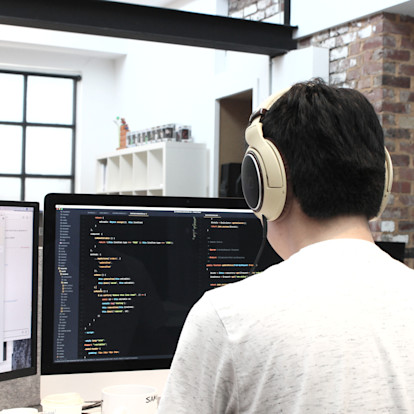Is learning to code hard?
Careers in coding and web development are highly sought after. And while learning to code as a beginner may seem daunting, there are tons of helpful tools and tips to help you get started on your coding journey.
We put together a 6-step guide that'll help you kickstart your path to learning coding and have some fun while doing it!
Step 1: Know the Basics
Before you get started on anything, it’s important to know what coding exactly is. Coding is the practice of writing instructions in a language that a computer can understand. There are many different coding languages available, depending on what you want the computer to do, and for what purpose. Just like how English, French, and German are languages people use to communicate all around the world, languages like HTML, CSS, and JavaScript are languages of the web.
Step 2: Learn Coding Languages
At Juno, we focus on the three main coding languages: HTML and CSS, and JavaScript.. These are the main coding languages of front-end development. Nearly every website is built using these languages to create visually appealing and functional websites for users. Here’s a summary of what these three languages are:
HTML: Hypertext Markup Language HTML is a fundamental coding language of the web. It is the foundational structure of a website, and allows you to incorporate content basics like headings, paragraphs, sections, footers, links, images, and more.
CSS: Cascading Style Sheets CSS is a coding language that adds style to the content of web pages and transforms simple websites to unique, personalized versions. With CSS you can add a custom colour palette, specific fonts, and create a layout that fits your personal brand or style goals.
JavaScript JavaScript is a more advanced coding language compared to HTML and CSS. With JavaScript you can add additional features to a website that enhance the user experience such as contact forms, animations, and personalizations. Some common forms of JavaScript include newsletter signup popups, notifications on social media, and location services.
Step 3: Try a Free Workshop
One of the best ways to discover if coding is for you is to attend a beginner-friendly coding workshop. Workshops are a great way to learn more about a topic in a risk-free, hands-on environment. They're also a great way to get to know a like-minded community of learners who are in the same boat as you.
Try searching up “free coding events” on Google, Facebook, or Eventbrite to see what kinds of local events are available. Juno also hosts free Coding 101 Workshops every month online, which are a great way to test the waters!
Step 4: Engage with the Online Community
You can also learn more about coding and whether a career in web development is for you by engaging with those who have taken coding courses or work in the industry. This can be through reading blogs, browsing online forums, connecting through social media, or joining tech events.
The Juno Alumni community is a great place to explore a network of people from non-technical backgrounds who have made the leap into tech! These connections may be able to share their knowledge, resources, and tips on how to learn coding as a beginner. Following along on Twitter is also a great way to meet some of our amazing grads!
Step 5: Join a Coding Course
Once you’ve done a little research and had the chance to explore coding through a workshop or event, a next great step is to enroll in a course! Coding courses provide a structured learning environment where you can learn web development from experts, and apply your new skills through hands-on projects and exercises.
If you're looking to dip your toes further into coding, you can take a part-time Web Development course - or if you're ready to dive into a career change, Juno offers a Web Development Bootcamp designed for absolute beginners!
Step 6: Practice Your Skills
Coding is a lifelong learning journey, and keeping your skills sharp with practice and upskilling is a big part of that! Here are a few ways you can practice your coding skills:
Play free online coding games There are loads of free coding games designed specifically for beginners. These games are interactive, fun, and a great way to solidify your skills!
Try out Codepen Codepen is a code editor where you can build, test, and discover more about front-end code. The best part about Codepen is the community aspect, and you’ll often get people interacting with your code and providing feedback. It’s an amazing application for beginners to coding to practice their coding with the added bonus of a supportive community!
Play in the Code Inspector: Code Inspector is a code analysis application that does automated code reviews and shows trends of your code base. This platform is a great way for new coders to get feedback on the technical issues of their code and practice how to improve them.
Build a demo project: The best way to practice your code is to build something, and a demo project is the perfect choice! At Juno, our Web Development Bootcamps students will build demo projects as a way to practice their coding skills in a self-guided way. Check out this collection of app ideas that are specifically designed for beginners to coding so you can practice your skills!
Ready to start your coding journey?
Join one of our free Coding 101 Workshops today! Through an instructor-led exercise, you'll learn how to build your own mini website with HTML and CSS:

